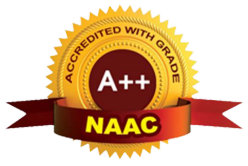The aim of the programme is to impart knowledge, skill and competencies to start one’s own business venture. To achieve the aim, the programme will focus on various aspects of startup, innovation and soft skills which are essential for the successful entrepreneur. The objective of the programme is to:
- Develop competencies among graduates in initiating business enterprise
- Facilitates successful and profitable operations of the enterprise
- Enable managerial skills for setting up of new enterprise
- Develop interpersonal skills and adopt good leadership behavior for empowerment of self and others
It has been designed to provide competency-based education to the youth in the area of entrepreneurship with an aim to turn ideas into an entrepreneurial venture. This programme will enable learners for critical thinking and problem solving by integrating theory with practice and case studies. Successful entrepreneurs will share their experiences through innovative blended learning and experiential learning approaches.
The programme will be able to cater the needs of those who intend to make their career as an entrepreneur, to be associated with research and would like to update their existing knowledge and skills in the field of entrepreneurship.
Teleconferencing
Teleconferencing is a one-way video and two-way audio facility. Teleconferencing is held every month. During teleconferencing session, you will get an opportunity to interact by phone in facility or fax with the resource persons/experts who participate in teleconferencing session and clear your doubts immediately.
The teleconferencing facility will be available at the Regional Centre and Selected Study Centres. The teleconferencing schedule will be sent to the Programme In-charge and Regional Director who would inform the students. Teleconferencing is done through GyanDarshan Channel. Learners must regularly attend these sessions. These will help them clarify doubts and interact with other learners all over the country.
Radio Counselling
Radio counselling will be held through FM and students can ask questions free of cost with phone in facilities right from their homes. A toll free telephone number 1800112347 and Telephone No.01129533103 have been provided for this purpose.
Telecast
The Programme will also be telecast through DD Gyan Darshan channel and schedule will be informed to students in advance.
• Audio-video
• Audio and video programmes for each course have been prepared to support learning for the learners. These Audio-video programmes in the form of cassettes are available at all Programme Study Centres. These Audio and video cassettes will be provided for viewing and listening. They can also hire the cassettes for viewing and listening.
• Attendance
Learners are required to attend classes at the study centers during counseling session. Although attendance is not compulsory but it is advise to attend the counseling for better understanding and to clear their doubt.
• Continuous Evaluation of Theory Component
• Assignments
Assignment is a means of continuing assessment of theory. Assignments will help you to recapitulate the theory and go back to the text again in case students are unable to answer a particular question. Thus assignments also help to reinforce learning. These assignments consist of a set of questions and activities that you will answer at your own place by referring your blocks. Assignments should be answered in your own words and should be handwritten and not typed.
The assignments will cover all types of questions (long answer type, short answer type, objective type, multiple choice questions and case studies). The assignments will carry thirty percent weightage. Students will be required to obtain forty percent marks as pass percentage in each assignment separately. Each assignment will carry 100 marks. In the final result assignments will carry thirty percent weightage.
• Project
Project is yet another important component of MA Entrepreneurship programme in both years. Successful completion of MAERP 001 in first year and MAERP 002 in a second year is a pre-requisite for completion of PGDER and MAER programme respectively. The synopsis has to be prepared by the learner as per the format given in the handbook of project under the guidance of the supervisor. The learner will start the Project data collection only after the approval of the synopsis. The viva-voce for the Project will be held at the Regional centre.
• Term-end Examination
As stated earlier, term-end examination is the major component of the evaluation system and it carries seventy percent weightage in the Final result. The University conducts term-end examination twice a year i.e., in June and December. They can take the examination only after completion of the course, failing which students can take the same in December or June of subsequent years within the total span of the programme. In case any student fail to get a pass score in the Tern-end Examination, the person will be eligible to reappear at the next Term-end Examination for that course as and when it is held, within the total span of the Programme.



